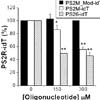 Inhibiting Plasmodium falciparum growth and heme detoxification pathway using heme-binding DNA aptamers.
Inhibiting Plasmodium falciparum growth and heme detoxification pathway using heme-binding DNA aptamers.Niles JC, Derisi JL, Marletta MA.
Proc Natl Acad Sci U S A. 2009 AugAbstract: The human parasite Plasmodium falciparum enzymatically digests hemoglobin during its intra-erythrocytic developmental stages in acidic food vacuole compartments. The released heme is rapidly detoxified by polymerization into the chemically inert pigment, hemozoin. Several heme-binding anti-malarial compounds, such as chloroquine, efficiently inhibit this process, and this is believed to be the predominant mechanism by which these drugs induce parasite toxicity. In an effort to expand the biochemical tools available for exploration of this pathogen's basic biology, we chose this heme-detoxification pathway as a model system for exploring the suitability of DNA aptamers for modulating this essential parasite biochemical pathway. In this report, we demonstrate that heme-binding DNA aptamers efficiently inhibit in vitro hemozoin formation catalyzed by either a model lipid system or parasite-derived extracts just as or more potently than chloroquine. Furthermore, when parasites are grown in red cells loaded with heme-binding aptamers, their growth is significantly inhibited relative to parasites exposed to non-heme-binding DNA oligonucleotides. Both the timing of parasite-induced toxicity and the concentration of heme-binding aptamer required for inducing toxicity correlate well with the uptake of red cell cytosolic components by the parasite, and the requirement for compounds with similar in vitro hemozoin inhibitory potency to preconcentrate within the parasite before observing toxicity. Thus, these heme-binding aptamers recapitulate the in vitro hemozoin inhibition activity and induce parasite toxicity in a manner consistent with inhibition of this pathway. Altogether, these data demonstrate that aptamers can be versatile tools with applicability in functionally dissecting important P. falciparum-specific pathways both in vitro and in vivo.
